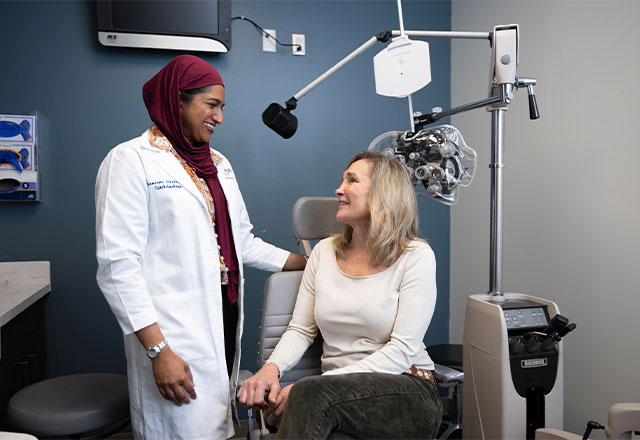United by a Patient-Centered Philosophy
Long-time patient Sharon Kress elaborates on the compassionate, skillful care she has received over the years.

Shameema Sikder and Sharon Kress
Sharon Kress’s hazel eyes glisten a little when she recalls her first visit to Wilmer. It was a stressful period in her life. She had recently been in a serious car accident, after which she was in a wheelchair for almost a year. Doctors thought she would not walk again.
By the time she arrived at Wilmer in 1998, she had proved that prediction wrong, but still had miles to go in her healing journey. She came to Wilmer in search of an oculoplastic surgeon to reconstruct her eye socket. For the next 20 years, oculoplastic surgeon Nicholas Iliff, M.D., cared for her and performed nearly all of her many eye surgeries, until his retirement in 2016.
“He’s an amazing man. I live in New Jersey and if I couldn’t get an appointment, he met me at Bayview on Saturdays,” she says, as just one example of how Iliff would go above and beyond for her. “When he retired, he said, I want to make sure I’ve left you with someone you can count on,” says Kress. That person was Shameema Sikder, M.D., a cornea specialist and the L. Douglas Lee and Barbara Levinson- Lee Professor of Ophthalmology.
For several years, Kress saw Sikder for checkups and they established a warm rapport. Then, in 2019, Kress came to understand exactly why Iliff had recommended Sikder.

Shameema Sikder, Nicholas Iliff and Sharon Kress in 2023
“It was Christmas Eve. My eyes started getting really infected. I was scared to death,” Kress recalls. She called Sikder, who talked her through what she could do to ease the symptoms and then told Kress to call her back to report on her progress. “And Dr. Sikder said, ‘If I don’t call you back immediately, it’s because I'm in Bangladesh,’” says Kress. “Right then I realized she’s very much like Dr. Iliff. She’ll drop anything to help somebody.”
This was a lesson Sikder learned from Iliff directly. When Sikder was a resident, she rotated with Iliff, which meant spending many hours with him as he performed surgeries and examined patients in the clinic. “He was just so empathetic. He told me, ‘Shameema, when someone calls you at two in the morning, that means they’ve been staring at their ceiling for four hours wondering, why is this happening?’”
His perspective profoundly shaped Sikder’s patient care approach — and has led to a meaningful bond with Kress. “We are united by this admiration for Dr. Iliff,” says Sikder. Kress agrees, of course. But she believes the compassionate, skillful care she received from Iliff is not limited to him. “The people who are here are just amazing people — they’re kind and giving and want to help,” says Kress.
